ESG represents a shift towards sustainability for banks
Nguyen Thuy Duong, chairwoman of EY Consulting Vietnam, spoke about how most banks are aware of ESG implementation and are deploying it at various levels.
At the first level, banks comply with regulations, appoint ESG leaders, form task forces, and consult global practices. At the second, they identify green lending opportunities but face challenges balancing funds and interests.
"Once balancing immediate benefits with long-term gains is achieved, it becomes evident that there are no lower interest rates for green projects. We previously believed concessional funds from international organisations or Official Development Assistance projects would lead to better loan rates, but that is not the case. In fact, the costs may actually be higher because numerous regulations and criteria must be met," said Duong.
 |
| Nguyen Thuy Duong, chairwoman, EY Consulting Vietnam |
Meanwhile, Ly Thu Nga, team leader of the Green Financial Sector Reform Component of the Green Growth Programme at the German Development Agency (GIZ) in Vietnam, highlighted lessons from study tours in Europe, where banks view green transformation, sustainable development, and ESG implementation as business growth opportunities.
"I believe that this is an opportunity for Vietnam to accelerate the implementation of ESG practices within our financial institutions and define future development directions. This presents opportunities in both the short and long term," said Nga.
"While scepticism about climate change may persist, the global trend continues towards collective action, including strong financial commitments at COP29, making change inevitable. Although not official just yet, developed countries are pledging increased support for developing nations in the transition process," she added.
 |
| Ly Thu Nga, team leader of the Green Financial Sector Reform Component of the Green Growth Programme at the German Development Agency (GIZ) in Vietnam |
Ta Duc Binh, senior researcher of Institute of Strategy and Policy at Natural Resources and Environment under the Ministry of Natural Resources and Environment (MoNRE) gave a different perspective that instead of discussing opportunities, which may appeal to many, the focus on risks and challenges may compel greater action.
"Three months ago, I joined a study conducted by the East Asian and Southeast Asian Economic Research Institute in partnership with a Japanese university. Covering markets in the US, China, South Korea, Japan, and the ASEAN region, the study revealed that businesses with high ESG scores in major markets like the US and Japan showed greater resilience during the pandemic. This highlights that ESG implementation can provide long-term benefits and equips businesses to navigate sudden challenges like COVID-19," said Binh.
 |
| Ta Duc Binh, senior researcher, Institute of Strategy and Policy at Natural Resources and Environment, MoNRE |
From the perspective of small- and medium-sized enterprises in Vietnam, which are often deemed less accessible to green credit due to scale limitations, Bui Bich Lien, founder and CEO of EMCOM, spoke about how the contributions a business makes to society should be the key criteria for evaluating the impact of investment capital. "Factors like green jobs and a clean environment are just the surface. Practical solutions such as dual transformation and technology integration into green transitions provide tangible and sustainable value," she said.
"Capital is critical for businesses. However, we do not necessarily need cheap capital but rather a partnership. Beyond assessing whether a business meets lending requirements, it is important to consider how the business contributes to society and what value the capital facilitated by banks brings to development."
"Short-term capital or preferential tax policies only partially support business development. Long-term solutions still lie in clear, standardised criteria, such as identifying the deeper societal problems businesses are addressing and how they are improving living environments," added Lien.
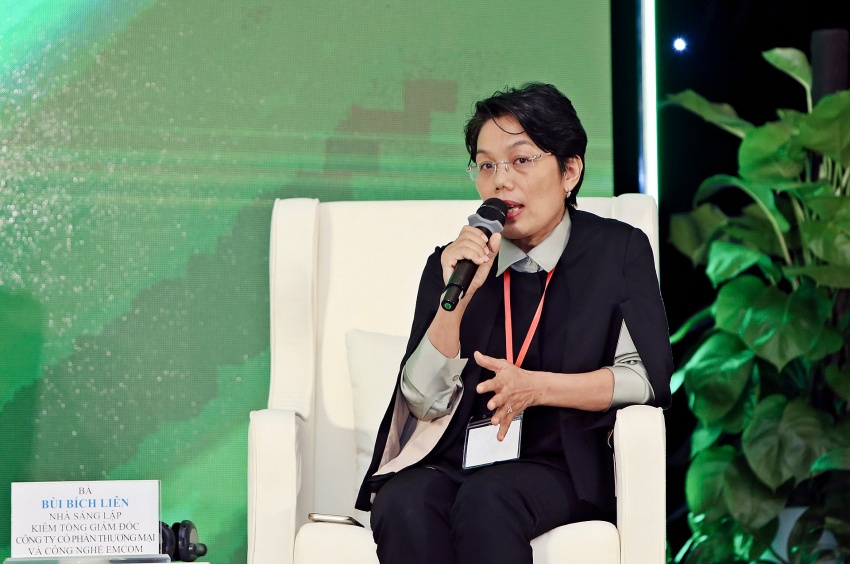 |
| Bui Bich Lien, founder and CEO, EMCOM |
In response to the difficulties faced by businesses, Nguyen Ba Hung, chief economist at Asian Development Bank (ADB) Vietnam, shared insights into the ESG criteria systems currently adopted by banks in Vietnam, addressing whether these changes pose excessive barriers to customers seeking capital and suggesting ways to adjust and resolve these issues.
Hung highlighted two specific perspectives on ESG or green climate-related factors. The first is the floor factor, viewed from a risk management standpoint.
"In the past, when assessing repayment capacity, we only considered financial risk management, whether the borrower could repay the debt, and if not, how much could be recovered. Now, ESG risk assessment goes beyond financial risk. Therefore, ESG risk management is increasingly integrated into financial risk management frameworks," said Hung.
The second is the ceiling factor, focusing on positive contributions. "For instance, addressing climate change, reducing environmental pollution, contributing to societal development, or enhancing governance are typically seen as outcomes of business operations rather than the lender’s role. Therefore, under normal conditions, banks do not need to prioritise these aspects," he added.
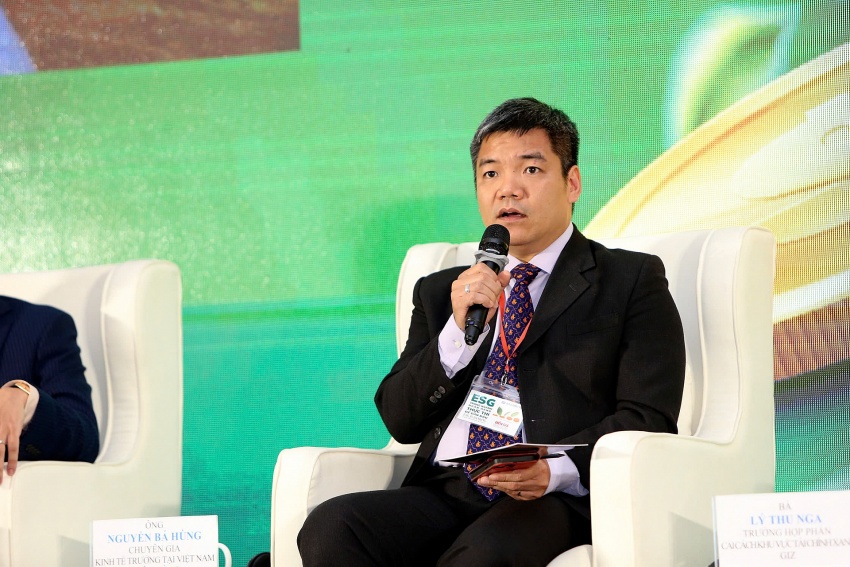 |
| Nguyen Ba Hung, chief economist, ADB Vietnam |
Le Mai, director of Relationship Management cum Sustainable Finance Country Lead at Standard Chartered Bank Vietnam said, "Sustainable finance is a top priority for Standard Chartered Bank. As an international bank, we follow global evaluation frameworks and standards. Comparing to a figure like 4.5 per cent is challenging because Vietnam does not yet have unified standards. However, green credit accounts for a significant share of our total lending."
The representative from Standard Chartered Vietnam said that the bank has committed $300 billion gloablly to sustainable financing by 2030, of which $87.2 billion had been disbursed by 2023. "We are eager to increase disbursement in Vietnam and other markets in the coming years," she said.
 |
| Le Mai, director of Relationship Management cum Sustainable Finance Country Lead, Standard Chartered Bank Vietnam |
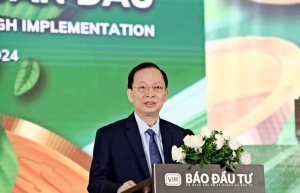 | ESG implementation in banking: from awareness to action Deputy Governor of the State Bank of Vietnam Dao Minh Tu emphasised that increasing ESG implementations requires financial institutions to consistently comply with evolving regulations, demonstrating environmental and social responsibility while enhancing their credibility and transparency. |
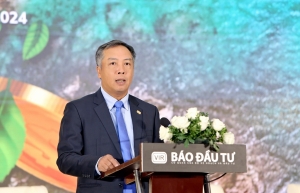 | VIR hosts 'ESG in Banking: Leading Through Implementation' conference Vietnam Investment Review organised the conference themed "ESG in Banking: Leading Through Implementation" at the Pullman Hotel, Hanoi on November 19. |
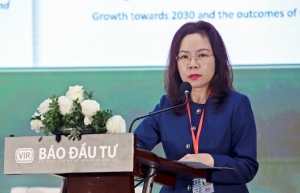 | Banking sector contributes to ESG, green growth, and sustainable development The banking sector has positioned itself as a pioneer in greening investment capital and enhancing social responsibility to achieve green growth and sustainable development goals. |
What the stars mean:
★ Poor ★ ★ Promising ★★★ Good ★★★★ Very good ★★★★★ Exceptional
Related Contents
Latest News
More News
- Private capital funds as cornerstone of IFC plans (February 20, 2026 | 14:38)
- Priorities for building credibility and momentum within Vietnamese IFCs (February 20, 2026 | 14:29)
- How Hong Kong can bridge critical financial centre gaps (February 20, 2026 | 14:22)
- All global experiences useful for Vietnam’s international financial hub (February 20, 2026 | 14:16)
- Raised ties reaffirm strategic trust (February 20, 2026 | 14:06)
- Sustained growth can translate into income gains (February 19, 2026 | 18:55)
- The vision to maintain a stable monetary policy (February 19, 2026 | 08:50)
- Banking sector faces data governance hurdles in AI transition (February 19, 2026 | 08:00)
- AI leading to shift in banking roles (February 18, 2026 | 19:54)
- Digital banking enters season of transformation (February 16, 2026 | 09:00)

 Tag:
Tag:



















 Mobile Version
Mobile Version